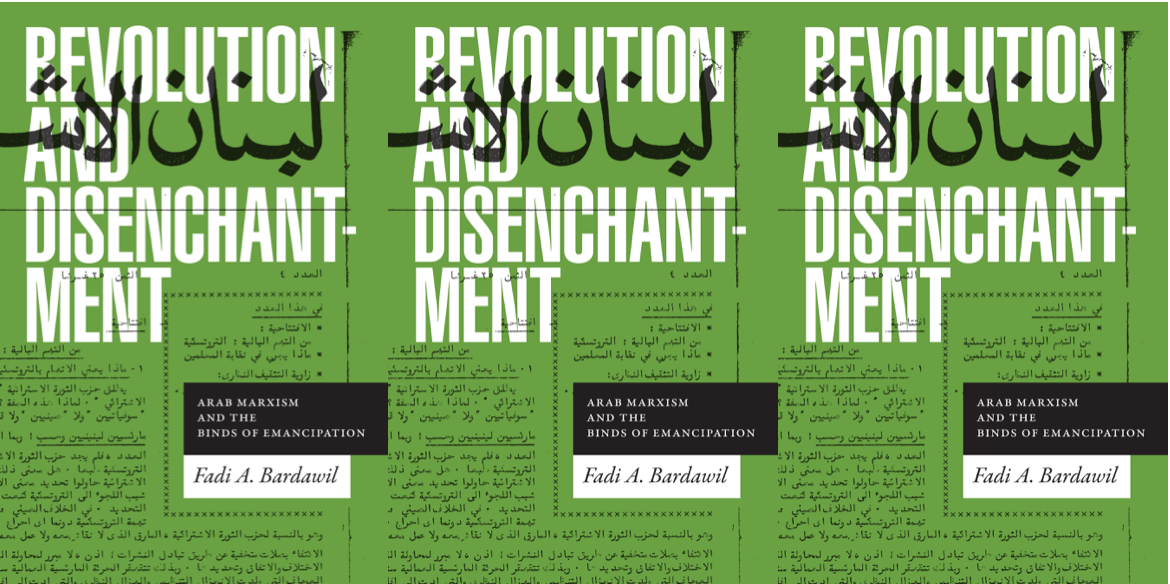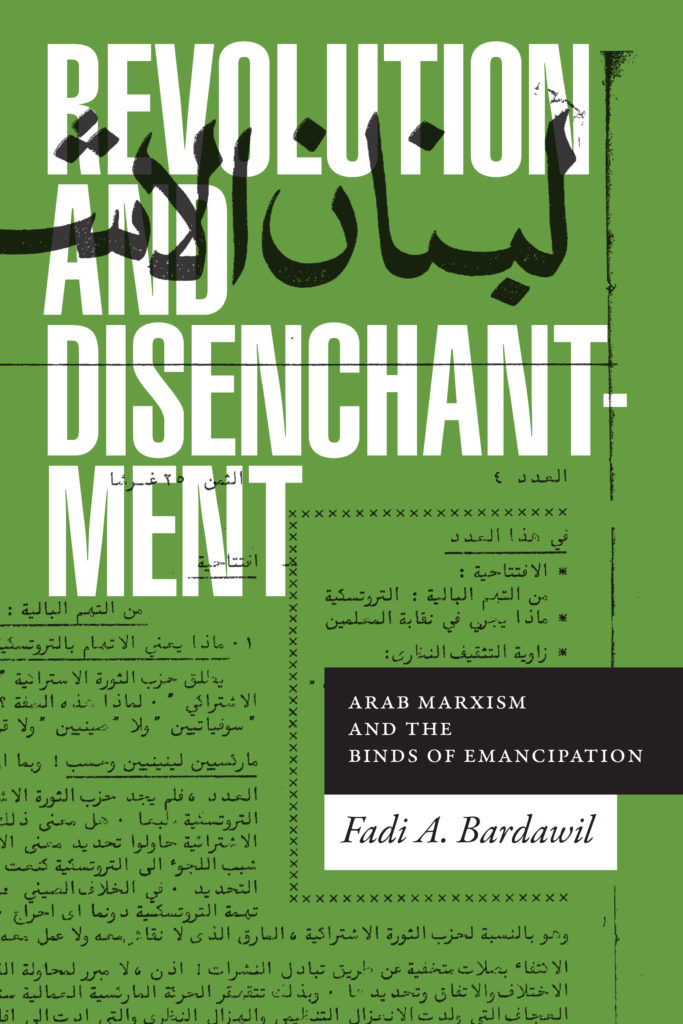
Book Under Review: Fadi Bardawil, Revolution and Disenchantment: Arab Marxism and the Binds of Emancipation (Duke University Press, 2020). ISBN: 978-1-4780-0675-6 ; 280 pages. $26.95 | Reviewed by: Sawyer Martin French.
Revolution and Disenchantment offers a powerful example of critical ethnographic engagement with radical intellectual and militant movements within in a broader intellectual world colored by a postcolonial divide. The book’s main cast is a generation of Lebanese Marxist intellectuals operating underground in the 1960s-70s under the organization Socialist Lebanon (SL), a non-Soviet aligned New Left group. The author, Fadi Bardawil, begins with an analysis of the horizons and dynamics of SL’s Marxist politics, and then follows these thinkers, especially the prolific Waddah Charara, through their disenchantment with a purely class-based politics during the Lebanese civil war.
“A major critical thrust of the book is Bardawil’s objection to a tendency found in postcolonial scholarship to subsume all discussion of intellectual trends in the Global South within a dichotomy framed by what he calls ‘epistemology critique.’“
A major critical thrust of the book is Bardawil’s objection to a tendency found in postcolonial scholarship to subsume all discussion of intellectual trends in the Global South within a dichotomy framed by what he calls “epistemology critique.” This brand of critique, popularized in the monumental work of Edward Said, has been taken up at length to identify and denounce the ways that many purportedly emancipatory discourses in the Global South are still shot through with epistemological assumptions inherited from imperial metropoles and therefore still allegedly aligned with power. This line of critique leaves us with a common dichotomy between on the one hand, “self-Orientalizing,” Westernizing natives seduced by the concepts of their oppressors and, on the other, “authentic” natives resisting the imposition of these foreign categories from within an indigenous conceptual framework (e.g. Islam) (19).
“The book’s main cast is a generation of Lebanese Marxist intellectuals operating underground in the 1960s-70s under the organization Socialist Lebanon (SL), a non-Soviet aligned New Left group.”
Bardawil resists this line of critique’s common framing of the postcolonial travel in ideas as simply unidirectional (West → South) and the concomitant tendency to treat theory as an autonomous social object spreading globally without the reflexive mediation of local actors. His “fieldwork in theory” attends to the “social lives of theory” (8), especially forms of critical engagement and translation (or “transfiguration”) within local contexts. He shows how SL members were in conversation with broader Third Worldist movements, engaging in debates that both invoked the West and avoided it. In chapter 2, Bardawil notes that these Lebanese Marxists’ studies in Paris during the 1960s and engagement with Parisian publications did not denote some form of Westoxification. Rather, he emphasizes that Leftist publishing in Paris at the time was an intellectual “bridge” for militants from across the global South, and the medium through which SL members eagerly read Mao, Fannon, and Guevara, as well as Althusser, Lenin, and Marx, seeking theoretical insights for their own political arenas (68). They were “theorists at the crossroads of transnational streams of discourse” (7) rather than the mere conduits of an encroaching Western episteme.
“…Leftist publishing in Paris at the time was an intellectual ‘bridge’ for militants from across the global South, and the medium through which SL members eagerly read Mao, Fannon, and Guevara, as well as Althusser, Lenin, and Marx, seeking theoretical insights for their own political arenas (68). They were ‘theorists at the crossroads of transnational streams of discourse’ (7) rather than the mere conduits of an encroaching Western episteme.”
These issues Bardawil raises with recent scholarship point to what he calls the “metropolitan unconscious” (1) of our critical academic disciplines. He reflects on how scholars’ denouncement of Arab activists as intellectual compradors is informed by a drive to resist a metropolitan politics of Islamophobia and imperialism, but tainted by a lack of similar care for the distinct problem spaces inhabited by those actors critiqued. In Bardawil’s view, there is a certain metropolitan privilege involved in the backgrounding of immediate politics in favor of exclusive emphasis on global fault lines and high theory, and a blindness implicit in the constant centering of the West as the sole/premier target of all critical theory. In contrast, Bardawil shows how the militant intellectuals of SL carefully attend to both global and local forms of domination, with an analytical commitment to centering power relations and the social.
The book is divided into two parts, both with three chapters. The first, “Time of History,” traces the theorizing and organizing of SL during its militant heyday in the 1960s, when the militants saw themselves as agents of a Marxist History working towards proletarian revolution. In Part II, “Times of the Sociocultural,” we see these dreams of class-based struggle decay during the 1970s in light of rising sectarianism and the eventual civil war, and watch as these thinkers try to navigate a political landscape in which class can no longer be imagined to be the defining mode of social organization and the locus of politics.
Chapter 1 narrates these intellectuals’ journeys in the years prior to their Marxist militancy, during which most were active Pan-Arabists. Bardawil notes the influence of the Nakba, Nasserism, the Algerian revolution, 1958 US intervention, and the short civil war on the broader anti-colonial moment. But the failure of the United Arab Republic in 1961 pushed these thinkers away from a simple politics of nationalist anti-imperialism towards one more attentive to the social fractures and forms of dominance within Arab society itself—i.e. towards Marxism.
Chapter 2 describes the theoretical work and politics of SL during the 1960s. Bardawil describes these militants’ ties to France and England and the centrality of their engagement with global networks of Marxist theory. He emphasizes how this theory was their means of engaging critically with Lebanese and broader regional politics, especially in their polemics against both Stalinist (“theoretically impoverished”) Communists advocating stagism (62) and Nasserist quasi-socialism not centered around control over the means of production (71).
Bardawil frames his analysis in this chapter as offering an alternative to “epistemology critique,” exemplified in the work of Buck-Morss (2003), who seeks to “rescue” Islamic thinkers as radical critical theorists while simultaneously dismissing (in nativist rhetoric) Arab Marxists as elitist Westernizers and modernists (54). Analyzing SL’s “Intro to Reading the Communist Manifesto,” Bardawil notes that the authors do identify the text’s Eurocentrisms, but as part of a larger effort to critically engage with it as an analytical tool for critical social diagnosis and revolutionary action—rather than positioning literary critique as an end in itself.
“Analyzing SL’s ‘Intro to Reading the Communist Manifesto,’ Bardawil notes that the authors do identify the text’s Eurocentrisms, but as part of a larger effort to critically engage with it as an analytical tool for critical social diagnosis and revolutionary action—rather than positioning literary critique as an end in itself.”
Chapter 3 describes the effects of the 1967 Arab defeat on SL’s politics and interventions. Their ensuing critical discourse differed from some Arab thinkers (like Sadik al-Azm) with culturist critiques of “Arab culture,” offering instead a critical analysis of power, class, and political structures within Arab societies.
In Part II, Chapters 4 and 5 document the slow disenchantment of Charara and other SL militants with Marxist analysis as they struggle with tensions of theory vs. praxis and vanguards vs. masses in a political world increasingly delineated on sectarianism.
In Chapter 4, we see Charara’s initial disenchantment with vanguardist Marxist organizations, which he argues often reproduce structures of domination and come to forward the petite bourgeois interests of the leadership (122). During a Maoist phase, he moves to a diverse working-class neighborhood as a form of etablissement and begins to think seriously about traditional forms of solidarity like sect and clan as more than just obstacles to emancipation. Disaffected from abstract theory as often impotent and reductive, Charara begins to think beyond the proletarian imaginary, seeking new ways to mobilize communal solidarities in service of emancipatory struggles.
Chapter 5, “Exit Marx/Enter Ibn Khaldun,” traces Charara’s thought during the Lebanese civil war, which occasioned the end of his militant activism and the increasing illegibility of SL’s prior Marxist analysis focused on class. From the ruins of their former politics, and witnessing the rise of political projects like Liberalism and Islamism, they could only resist as individual intellectuals—no longer militant agents of History—engaged in “permanent critique” (155) of the universalisms offered by all sides.
Chapter 6 juxtaposes this cynical disposition of Charara and others with two alternative contemporary political moves taken by former Leftists: many in the Maoist vein took up Islamism as the expression of the masses, while others opposed them in defense of Enlightenment reason, retreating to what al-Azm called a “second line of defense” (172). The chapter frames the debates between these different camps through a focus on receptions in the Arab world of Said’s Orientalism and its critique of Marx. Though many on the Left drew from his anti-essentialist message to rebuff Islamist nativism, they fought back against Said’s critique of Marx as Orientalist (which implicated their own theoretical dependence on him) and pointed out the essentialist nature of Said’s own portrayal of Orientalism as inherent to Europe itself, rather than a product of power and class positions (179).
The chapter concludes by again emphasizing the methodological importance of attention to the particular problem-spaces of thinkers in ways that bridge the local/global. His account resists a reading of these Arab discourses as “belated” or bastardized versions of more advanced metropolitan academic theory, instead situating both within their multivalent political stakes and horizons. Bardawil reminds readers that academic theories are always socially embedded. He resists tendencies to treat radical postcolonial theory as abstract and extractable, with theorists in the Global South often held up against some ideal emancipatory political model imagined to exist in the metropolitan academy, with peripheral academies constantly playing catch-up.
“Bardawil articulates his resistance to epistemology critique and his attention to the particular Lebanese problem-space as an exercise in decentering the West. Indeed, he engages the ways that SL militants struggled and worked within an imperial world, but not at the expense of overshadowing their more immediate agitation against local forms of power.“
Bardawil articulates his resistance to epistemology critique and his attention to the particular Lebanese problem-space as an exercise in decentering the West. Indeed, he engages the ways that SL militants struggled and worked within an imperial world, but not at the expense of overshadowing their more immediate agitation against local forms of power. His account will undoubtedly serve as a model for scholars working with activists in the Global South, struggling with the task of engaging their politics carefully in the academic shadow of a half-century of epistemology critique. But beyond offering a model for ethnographers, Revolution and Disenchantment is also a sourcebook rich with SL members’ insightful ways of thinking through core questions in the Marxist tradition, like the relations between theory and practice, base and superstructure, vanguard and masses. The book succeeds doubly as a model for both ethnography and intellectual history.
Sawyer Martin French (@WharfScenery) is a lecturer at Sunan Kalijaga University in Yogyakarta, Indonesia and co-manages The Suryakanta, an Indonesian forum for reviews of academic books.
*The author first presented this review at Fourth Annual Graduate Students Book Review Colloquium on Islam and Middle Eastern Studies in 2020 organized by Ali Vural Ak Center for Global Islamic Studies at George Mason University and the Maydan in collaboration with the Fall for the Book Festival.


